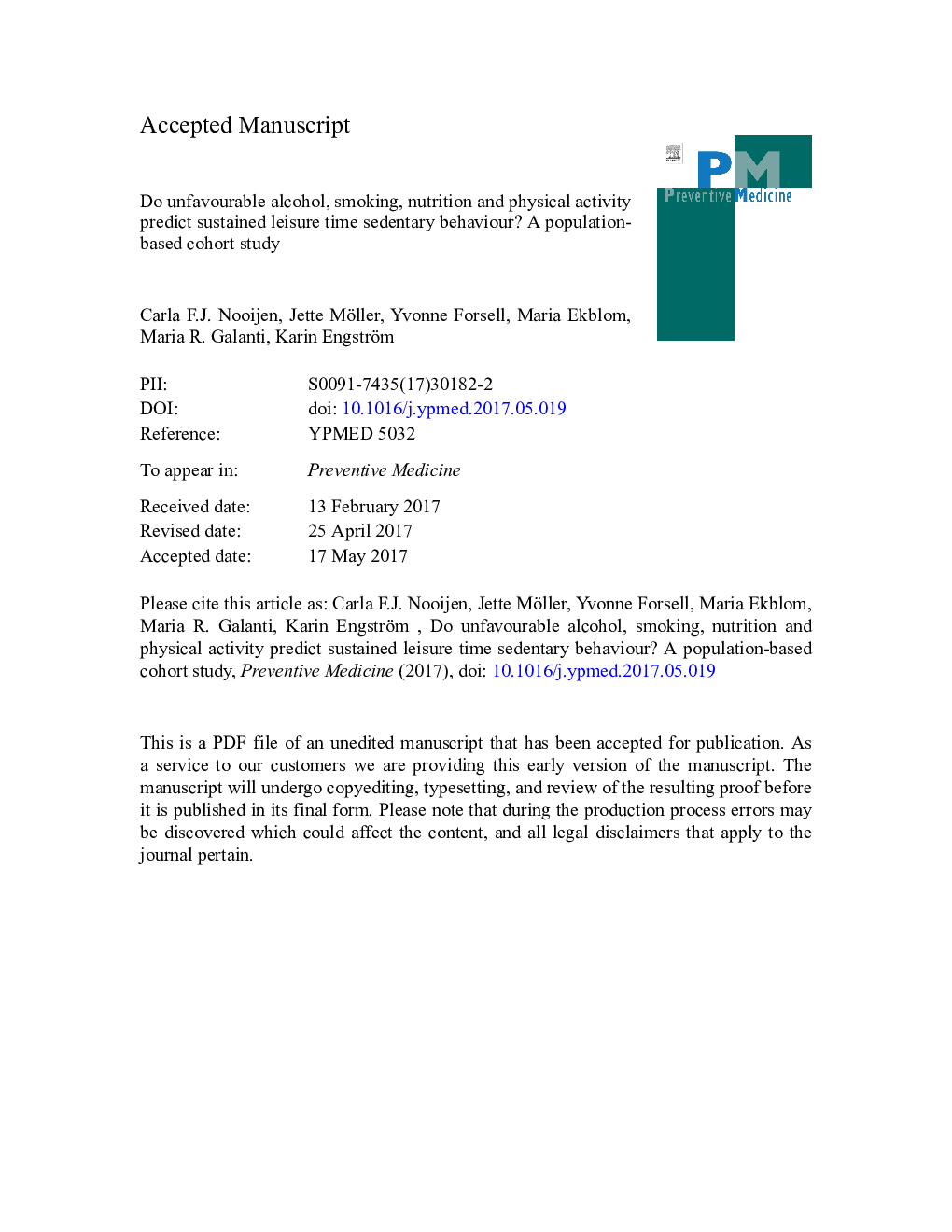| کد مقاله | کد نشریه | سال انتشار | مقاله انگلیسی | نسخه تمام متن |
|---|---|---|---|---|
| 5635514 | 1581613 | 2017 | 20 صفحه PDF | دانلود رایگان |
عنوان انگلیسی مقاله ISI
Do unfavourable alcohol, smoking, nutrition and physical activity predict sustained leisure time sedentary behaviour? A population-based cohort study
ترجمه فارسی عنوان
آیا الکل نامناسب، سیگار کشیدن، تغذیه و فعالیت های بدنی پیش بینی رفتار بی نظیر اوقات فراغت پایدار است؟ یک مطالعه همگروه مبتنی بر جمعیت
دانلود مقاله + سفارش ترجمه
دانلود مقاله ISI انگلیسی
رایگان برای ایرانیان
کلمات کلیدی
فعالیت موتور، ورزش، غذا، سیگار کشیدن، نشسته،
موضوعات مرتبط
علوم پزشکی و سلامت
پزشکی و دندانپزشکی
طب مکمل و جایگزین
چکیده انگلیسی
Comparing lifestyle of people remaining sedentary during longer periods of their life with those favourably changing their behaviour can provide cues to optimize interventions targeting sedentary behaviour. The objective of this study was to determine lifestyle predictors of sustained leisure time sedentary behaviour and assess whether these predictors were dependent on gender, age, socioeconomic position and occupational sedentary behaviour. Data from a large longitudinal population-based cohort of adults (aged 18-97 years) in Stockholm responding to public health surveys in 2010 and 2014 were analysed (n = 49,133). Leisure time sedentary behaviour was defined as > 3 h per day of leisure sitting time e.g. watching TV, reading or using tablet. Individuals classified as sedentary at baseline (n = 9562) were subsequently categorized as remaining sedentary (n = 6357) or reduced sedentary behaviour (n = 3205) at follow-up. Lifestyle predictors were unfavourable alcohol consumption, smoking, nutrition, and physical activity. Odds ratios (OR) and corresponding 95% Confidence Intervals (CI) were calculated, adjusting for potential confounders. Unfavourable alcohol consumption (OR = 1.22, CI:1.11-1.34), unfavourable candy- or cake consumption (OR = 1.15, CI:1.05-1.25), and unfavourable physical activity in different contexts were found to predict sustained sedentary behaviour, with negligible differences according to gender, age, socioeconomic position and occupational sedentary behaviour. People with unfavourable lifestyle profiles regarding alcohol, sweets, or physical activity are more likely to remain sedentary compared to sedentary persons with healthier lifestyle. The impact of combining interventions to reduce leisure time sedentary behaviour with reducing alcohol drinking, sweet consumption and increasing physical activity should be tested as a promising strategy for behavioural modification.
ناشر
Database: Elsevier - ScienceDirect (ساینس دایرکت)
Journal: Preventive Medicine - Volume 101, August 2017, Pages 23-27
Journal: Preventive Medicine - Volume 101, August 2017, Pages 23-27
نویسندگان
Carla F.J. Nooijen, Jette Möller, Yvonne Forsell, Maria Ekblom, Maria R. Galanti, Karin Engström,
